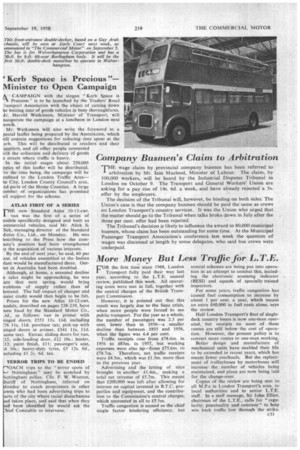More Money But Less Traffic for L.T.E.
Page 77

If you've noticed an error in this article please click here to report it so we can fix it.
FOR the first time since 1948, London Transport fully paid their way last year, according to the L.T.E. annual review, published this week. All operating costs were met in full, together with the central charges of the British Transport Commission. However, it is pointed out that this result was largely. .due to the Suez crisis, when more people were forced to use public transport. For the year as a whole, the number of passengers. was 2.3 per cent. lower than in 1956--a smaller decline than between 1955 and 1956, when the figure was 4,4 per cent.
Traffic receipts rose from £78.6m. in 1956 to £83m. in 1957, but working expenses were also up—from £.75.6m. to E78,7m. Therefore, net traffic receipts were 14.3m., which was £1.3m. more than in the previous year.
Advertising and the letting of sites brought in another £1.4m., Making a total net revenue of £5.7m. This meant that £200,000 was left after allowing for interest on capital invested in B.T.C: properties and equipment, and the contribution to the Commission's central charges, which amounted in all to £5.5m.
Traffic congestion is named as the chief single factor hindering efficiency, but several schemes are being put into operation in an attempt to combat this, including the electronic scanning indicator (BESI) and squads of specially trained inspectors.
For some years, traffic congestion has caused fuel consumption to increase by about I per cent. a year, which means an extra £60,000 in fuel costs alone, says the review.
Half London Transport's fleet of singledeck country buses is now one-man operated, but receipts on most of these routes are still belowthe cost of operation. However, the present policy is to convert more routes to one-man working.
Better design and manufacture of mechanical units have enabled their life to be extended in recent years, which has meant fewer overhauls. But the replacement of trolley buses by motorbuses will increase the, number of vehicles being maintained, and plans are now being laid for the change-over.
Copies of the review are being sent to all M.P.s in London Transport's area, to local authorities and to senior L.T.E. staff. In a staff message, Sir John Elliot, chairman Of the L.T.E., calls for "regularity, punctuality and courtesy" to help win back traffic lost through the strike.
















































































































































































































